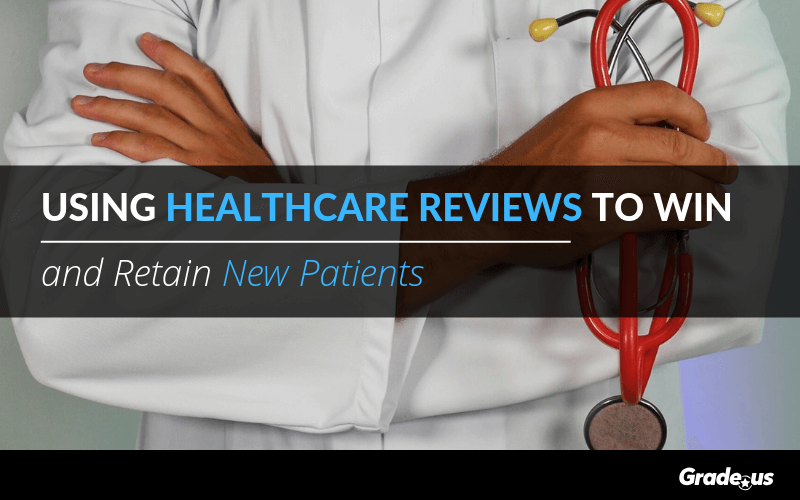Are reviews an important part of healthcare?
Why would healthcare professionals choose to focus their valuable time and attention on reviews? If you're the only healthcare facility in your area doesn't that mean patients have to come to you?
Not exactly.
As it turns out, the data is clear on this. Reviews are incredibly important to your patients. Like it or not, it's important to healthcare providers as well.
Why?
Your online healthcare reviews mean your patients always have a choice
Research shows patient retention depends on a variety of important factors. These factors also determine whether the patients in your practice or organization are willing to write a positive review. Factors like...
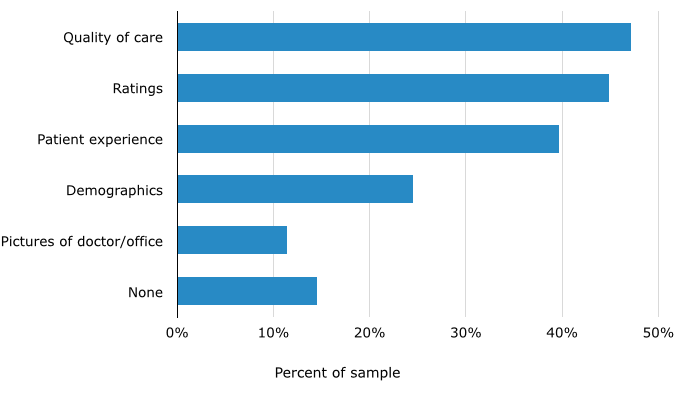
The three biggest factors, the most sought-after information is precisely what you'd expect. Quality of care, ratings and patient experience. This is followed by:
1. Accuracy of diagnosis
2. Listening and communication skills
3. Delivery of treatment
4. Time spent with patient (including bedside manner)
This all makes sense though, doesn't it? This is what most patients want. What's also unsurprising is the impact reviews have on your patient's experience.
- 82% of patients stated online reviews influence their willingness to be treated by a doctor
- 70% of patients stated online reviews are crucial when selecting a healthcare provider
- 50% of patients believe a doctor’s reputation is worth considering if they have at least 10 reviews
- 85% of patients are uncomfortable choosing a physician if 10 percent of their reviews have a one-star rating
- 61% of patients say they’ve avoided doctors/clinicians based on negative reviews
- 75% of patients expect to read/see at least seven reviews before they trust them
- 78% of patients need to see seven comments that say the same thing before they believe and acknowledge a trend
- 48% of patients trust online reviews as much as a recommendation from their doctor!
- 66% of patients will wait for an appointment with a physician who has better reviews
- 75% of patients feel the healthcare provider’s reviews lose credibility after 12 months
- 72% of patients expect their review to lead to broad organizational change
Here's another significant trend. Online reviews have the greatest impact on healthcare providers, more than any other service provider. If you're a healthcare provider this makes sense.
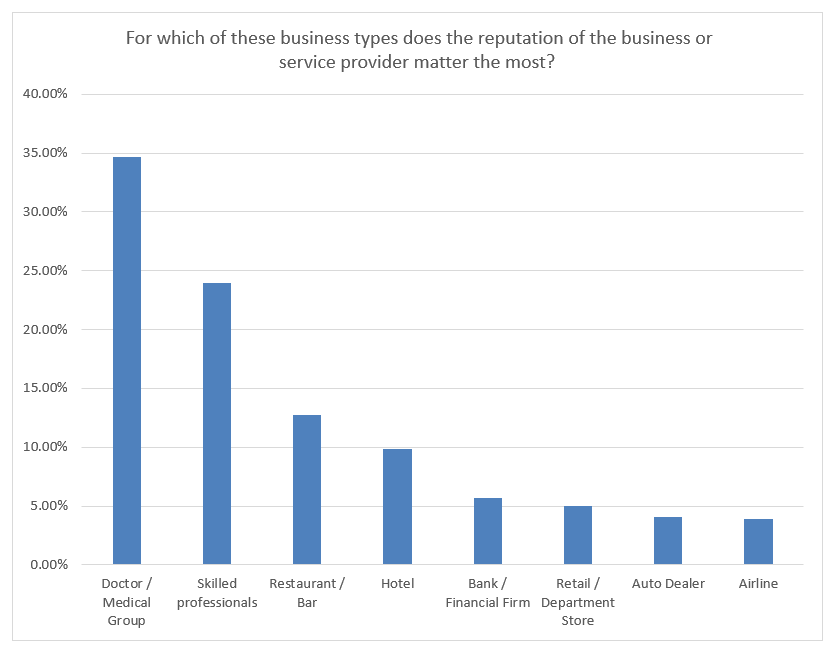
Here's the problem.
Healthcare providers aren't in sync with their patients.
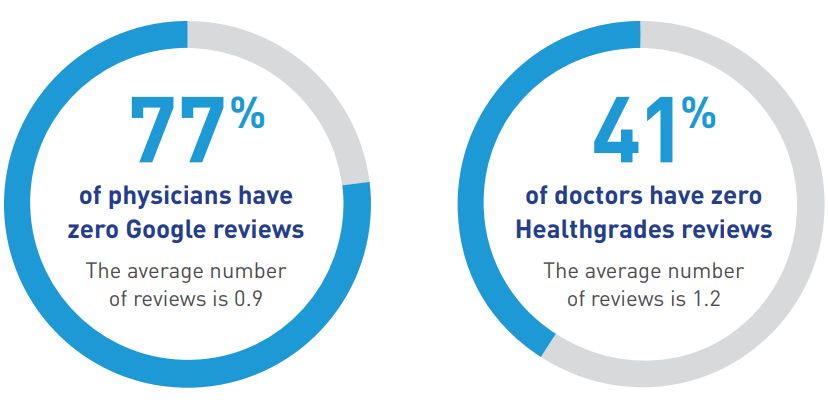
Clinicians have a negative view of online reviews. A recent study published in the Journal of General Internal Medicine found 75% of clinicians felt third party reviews (e.g. ZocDoc, Healthgrades, etc.), stressful. Almost half of the providers stated these reviews put a strain on the patient-provider relationship; 33% of clinicians stated reviews could harm patient care.
Here's the disconnect.
Some healthcare providers, like the University of Arkansas Medical System (UAMS), have decided to create their own review platforms. These providers feel their review platforms are more balanced and fair. Their patient's response is predictable.
They don't trust their healthcare provider's review platforms.
Patients believe there's a bias and they're right. The same report published in the Journal of General Internal Medicine found only 47% of patients trusted their healthcare provider's review platforms. This doesn't mean healthcare providers are wrong though.
What's the solution?
"What matters is that patient [reviews] are out there, so no matter how outdated the [review] is or how irrelevant it appears, patients are still making decisions based on it."
~ Elizabeth Davis, Reputation Manager at HCA
If you're interested in directing patients to your in-house platform, do so, but be responsive to the third-party review platforms your patients are already using. Implement systems and procedures to attract five-star reviews from the patients you've served.
In short, meet your patients where they are.
Where are patients searching for healthcare facilities?
Today, patients rely on a variety of sources and channels for healthcare recommendations. According to the Healthcare Consumer Survey: The Impact of Online Reviews on Selecting Providers, Google and health insurance websites are the primary tools patients use to find a clinician online.

From there, patients are funneled to several healthcare review platforms.
So how do patients search for the right clinician or doctor? If they're browsing through Google they'll use a variety of broad, niche and local searches to identify the specialist they're looking for. For the purposes of our example, we'll focus on finding a pediatrician.
Prospective patients may see search results that look a bit like this:
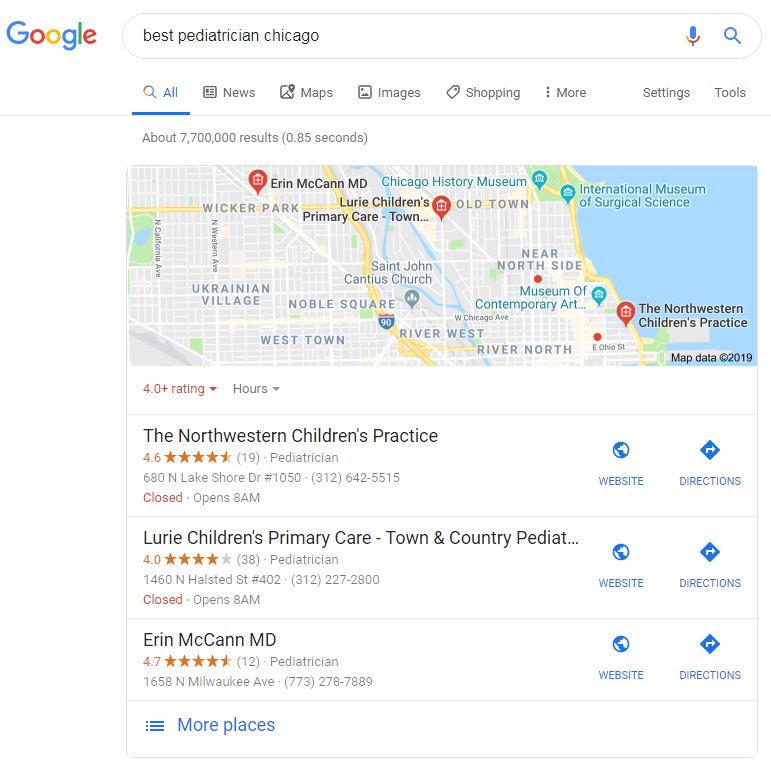
And reviews that look like this:
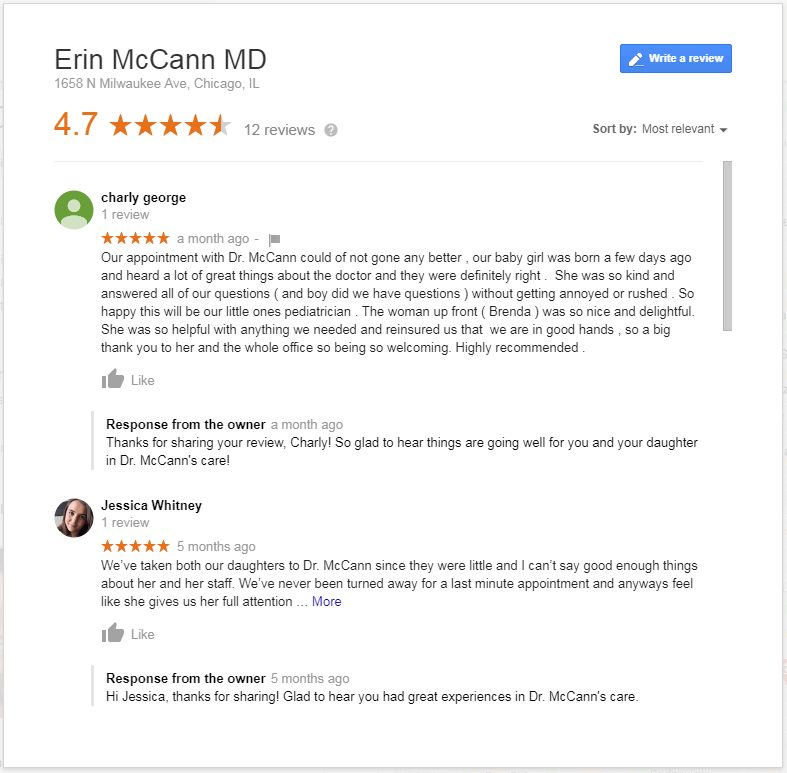
If we're searching through ZocDoc we may see results that look like this:
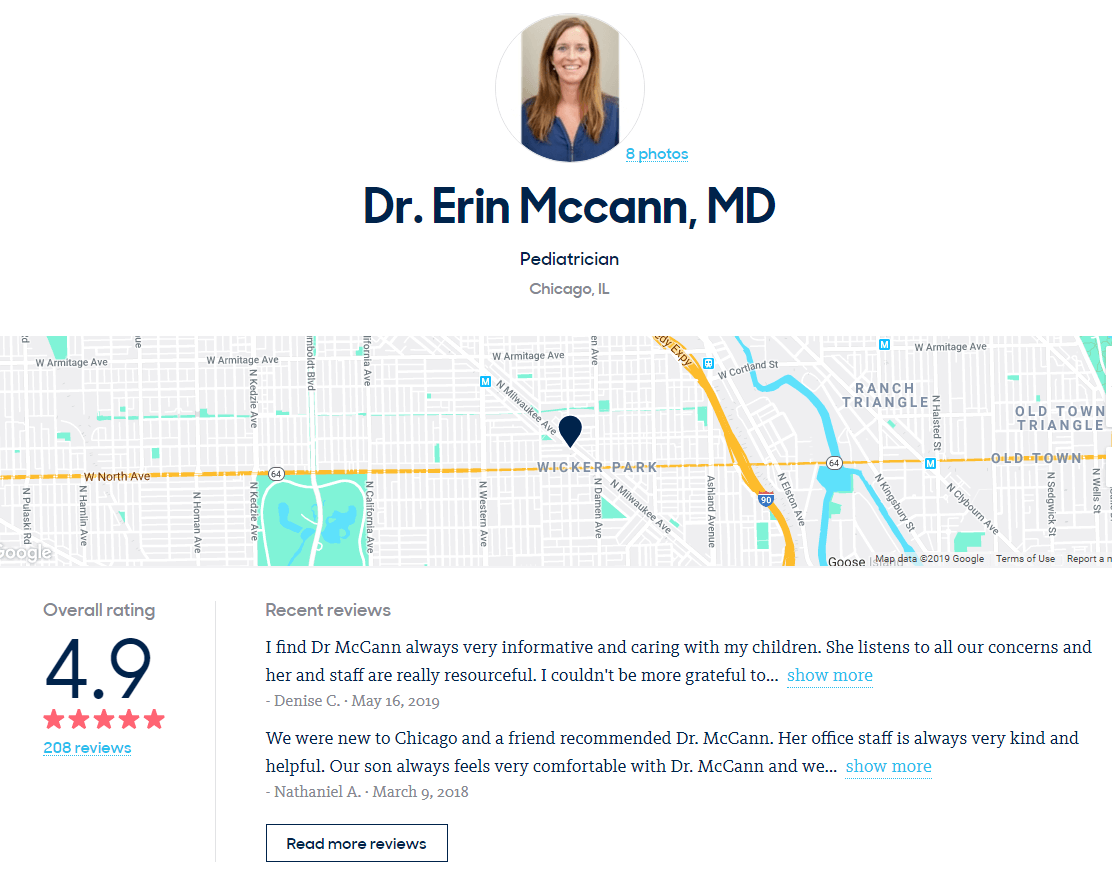
Yelp reviews are straightforward:
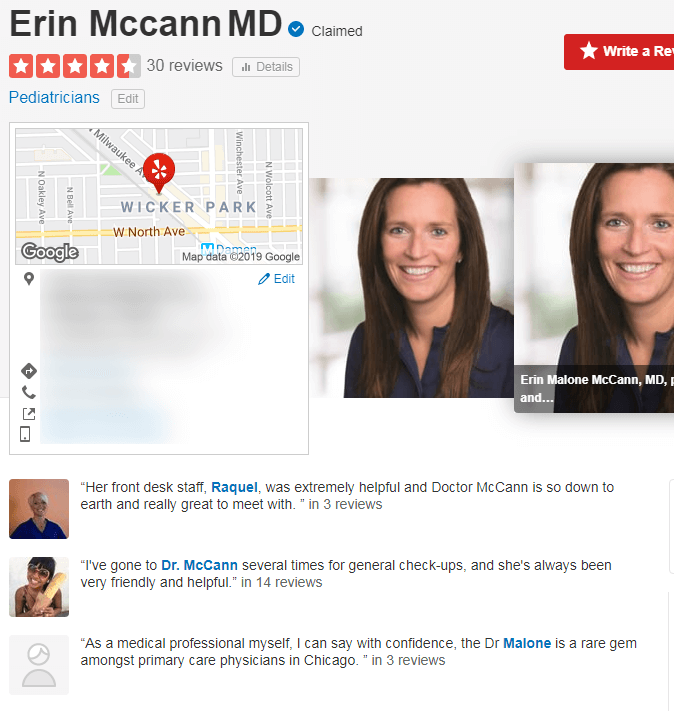
Here's the interesting thing about searcher behavior. When it comes to keyword data, the healthcare industry requires specialization and interpretation. For example, when I enter broad queries like "pediatrician Chicago" into Keywordtool.io we get an interesting mix of results.
We see the usual local queries:
- Best pediatrician
- Best pediatrician near me
- Best pediatrician Chicago
- Best pediatrician Chicago Loop
- Best pediatrician Chicago Ridge
- Top pediatrician near me
- Top pediatrician Chicago
- Top pediatrician Chicago Loop
- Top pediatrician Chicago Ridge
But we also see contextual queries like these:
- Holistic pediatrician
- Developmental pediatrician
- Behavioral pediatrician
- Naturopathic pediatrician
- Pediatrician specialist
- Pediatric cardiology
- Pediatrics for babies
- Pediatrics for autism
And organization specific queries like these:
- Northwestern pediatrics
- Lakeview pediatrics
- Donohoe pediatrics
- North Shore pediatrics
- Lurie Children’s Primary Care pediatrics
- Streeterville pediatrics
- Pediatrics near Cook County Hospital
Some generic queries have transactional value:
- Hospitals with pediatrics near me
- Pediatrics with no insurance
- Pediatrics with intellectual disability
- Pediatrics near me open now
- Pediatrics near me urgent care
- Pediatrics dealing with difficult parents
This is interesting as there is a wide variety of pediatrician subspecialties. These subspecialties mean there's a significant amount of permutations you can use to improve your organization's local search rankings in Google. How do keyword queries lead patients to your office?
1. A symptom search: Patients enter their symptoms and search engines (Google or Bing). Depending on the demographic, some patients may also turn to industry-specific websites like WebMD.
2. Self-diagnosis: Depending on the severity of their symptoms your patient will decide whether or not they need treatment. At that point, if they don't have a primary care provider they'll search for professionals who can treat their symptoms.
3. Provider selection: Patients use prospective provider information to vet clinicians, answer questions and defuse objections (e.g. do they accept my insurance? Are they open now? What do other patients say about them in their reviews?). At this point, patients are ready to choose a provider (you).
4. Provider performance: Your patients makes an assessment of their experience. They use a variety of factors to measure your performance (e.g. wait times, bedside manner, available parking, food selection, accuracy of diagnosis, your listening and communication skills, etc.).
5. Patient feedback: Your patient chooses to share their experiences publicly via their online review. This has a substantial effect on other prospective patients and their provider selection process. Your patient's feedback has far-reaching consequences on your client acquisition capabilities. This is the step most clinicians ignore, choosing instead to rely on their providers to carry the weight.
Each step plays an important role.
When each step is handled appropriately, clinicians produce outstanding results for their organization. More patients, higher fees, less expense.
Does this mean healthcare reviews are a competitive advantage?
Patients will wait longer and pay more for an appointment with a doctor who has better online reviews. Your online reviews are proof you provide your patients with outstanding service, superior care and a fantastic experience.
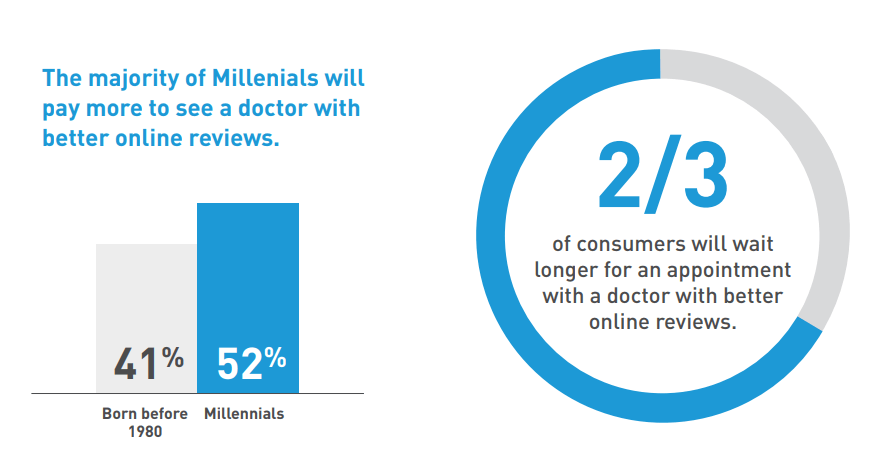
But, a competitive advantage?
Absolutely.
Healthcare touches every part of your patient's lives. Healthcare, in every case, is about health maintenance or improvement. In some cases, adequate healthcare is a matter of life and death. This comes with considerable risk. A poor choice may come with significant consequences.
There's a lot online.
Your patients know it which is precisely why they rely on other patients to get the validation and peace of mind they need. Your patients use online reviews to gauge expertise. Most of them aren't doctors, dentists, surgeons or clinicians. They don't have the education needed to properly evaluate your performance.
But they understand results.
Produce exceptional results for your patients, then ask them to share their experience publicly. It's a simple framework you can use to create a permanent competitive advantage. It's an easy win for most healthcare specialties.
Why?
A strong review portfolio gives healthcare providers and clinicians the social proof they need to attract prospective patients easily, and at a lower cost. Which means it's absolutely essential that healthcare providers request reviews.
Wait a minute, what about HIPAA?
How healthcare providers should request reviews
We all know about protecting patient confidentiality. Not sharing a patient's protected medical data. On interviews this complicate things a bit. It's easy for clinicians to violate HIPAA. Here are a few examples.
Patient: "Dr. Wellesch refused to take my symptoms seriously. He implied that my discomfort was all in my head.
Clinician: "Hello there! I'm sorry you felt I invalidated. I wasn't trying to suggest that you weren't in pain, just that ligaments in your knee weren't torn completely.
Instant HIPAA violation.
When you respond to online reviews it's important to tread carefully. Simply acknowledging that you saw or treated your patient may be enough to violate HIPAA. Even if your patient acknowledges their symptoms, stating openly they saw you it may be a violation for you to acknowledge or confirm.
Here are some helpful tips to maintain HIPAA compliance.
Whether you're responding to a positive or negative review your review should accomplish these distinct objectives.
1. Thank your patient for their review. Avoid filler text and glittering generalities. Avoid preaching, lecturing or bullying your patients. Instead, provide them with the tools and resources they need to resolve their problems.
2. Provide your patients with general confirmation or validation of their concerns. A simple way to do this is by repeating your patient's grievances back to them, minus patient protected data, in your own words. Do not discuss specific aspects of their treatment and care.
3. Provide patients with an invitation to investigate, rectify and solve the problem they feel you've created. Provide them with your name and contact information. Do not share details on their diagnosis, complications or outcomes. If patients out themselves, don't repeat, expand or confirm it.
Here are some templates you can customize. You'll want to change these templates so it matches the cadence, tone and values of your organization.
Negative reviews (3 stars or below)
Hi [Patient Name],
Thanks for your feedback. I'm so sorry we let you down. I'd like to investigate these mistakes further and take action on this.
Would you be willing to call me directly at [Your Number]?
I want to make sure that I get the full story on this.
Thanks in advance for your willingness to help.
[Signature]Positive reviews (4 stars or above)
Hi [Patient Name],
Thanks for your feedback. I'm so happy you had a positive experience.
Please let me know if we can do anything else to improve!
We're happy that you're happy! 🙂
[Signature]With other industries, (i.e. law firms), it's ideal that the professional is responsible for the review. That's not really a great idea here. Ideally, you'll want to make sure that your organization (the provider not the clinician), in an official capacity, is responsible for your review management campaigns. Think corporate vs. individuals.
Do everything you can to ensure compliance.
Regardless of the review (positive or negative) patients expect a rapid response. This means you'll need to round out your review management monitoring and campaigns by relying on:
1. A review funnel SaaS software tool like Grade.us
2. A follow-up system (an autoresponder system that sends email, text and direct mail messages)
3. Your follow-up templates (see above)
4. A first responder/manager (to manage your reviews)
You'll want to ensure that first responders are cool, calm, collected and most importantly, unflappable. Give them the tools and resources they need to manage your review management campaigns efficiently. Start with the third-party review sites mentioned above.
What about sharing?
Are there good ways to share patient reviews?
When you promote your online reviews, you create leverage. Leverage acts as a marketing force multiplier, extending the power, reach, and life of each positive review.
- Social proof on your website via embeddable widgets like the Grade.us’ Review Stream widget.
- Social media shares. You can use Twitter’s location and search function + your keyword list mentioned earlier, to share your reviews with local and/or interested clients.
- Advertising. Tag visitors who visit your website. Then, use remarketing to attract prospective patient’s attention. If you’re a pediatrician you can create a symptoms guide that provides parents with a list of commonly ingested, but exceptionally dangerous items in your home that toddlers are drawn to.
- Printed materials with positive reviews. You can promote them in your direct mail pieces and send them to prospective patients who are in the market for your services.
Here are a few additional review marketing tactics you can use to promote your healthcare organization; our ultimate review management checklist and a straightforward way to audit your review management campaigns.
- The Ultimate 2020 Review Management Checklist Guide
- How To Perform a Review Management Audit
- 6 Ways To Use Online Reviews In Marketing Materials
Use these review management tactics to attract, win, and retain new patients
Online reviews are an essential part of your healthcare organization. As we've seen, patients are willing to wait longer and spend more money. Online reviews have the greatest impact on health care providers, more than any other service provider.
Most healthcare providers aren't in sync with their patients.
There's a disconnect. This is your opportunity. The vast majority of patients want to hear from third-party review sites. Most clinicians are unwilling to do that. They're stressed out and overwhelmed by the idea of third-party reviews. They'd prefer to work with an in-house or peer-reviewed system.
It's a great start, but it isn't enough.
Your patients are interested in the same things they always have been. Quality of care, superior ratings, and positive patient experience. It's the reason why 70% of patients believe online reviews are indispensable when selecting a healthcare provider. With a mix of in-house and online reviews, you'll have everything you need to win and retain new patients.
About the Author
Andrew McDermott
Andrew McDermott is the co-founder of HooktoWin. He shows entrepreneurs how to attract and win new customers.

